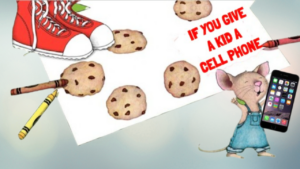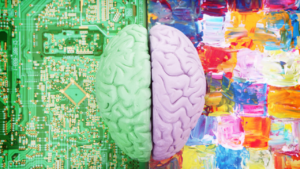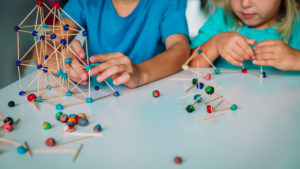
Kids & Phones: Making Wise Choices in the Digital Age
We live in an age where technology has become an integral part of our lives, and children are being given cell phones at younger and younger ages. Inspired by the beloved children’s book “If You Give a Mouse a Cookie,” let’s discuss the topic of giving a kid a cell

End-of-Year Transition: The Kaleidoscope of Change
As the school year comes to a close, it’s natural for students, parents, and educators to reflect on the journey they’ve taken together. This reflection often brings about thoughts of change, and the potential challenges and excitement that lie ahead. Change can sometimes be intimidating, but today, we’ll explore how

Unlocking The Secrets Of Emotion: A Guide For Parents And Teachers
As parents and teachers, we often find ourselves struggling to navigate the emotional ups and downs of our children. One moment they are overjoyed with excitement, and the next, they are reduced to tears. It can be challenging to know how to help our children manage their emotions effectively. However,

Overcoming Test Anxiety: 6 Helpful Strategies for Students
Oh, spring. The sun is shining, the flowers are blooming, and the students are…stressed out of their minds? Ah, yes, it must be state testing season! As elementary teachers, we know that testing can be a source of anxiety for our students. But fear not! There are strategies that we

Sad Isn’t Bad: How to Cope While Letting Kids Grow
Parenting is no easy feat. It’s a job that requires patience, perseverance, and a lot of love. But one thing that often gets overlooked is the importance of allowing children to experience a range of emotions, even the uncomfortable ones. As much as we want to protect our kids from

Affirmations: Powerful Little Pep Talks for Your Brain
Hi everyone! Have you ever heard of affirmations? Affirmations are simple, positive statements that we repeat to ourselves to provide encouragement and motivation. And did you know that they are based on science? Our brain’s language is repetition. Whatever we say or think or do repeatedly sticks in our brain.

The Art of Memory Making: How to Create Positive Thoughts in the Minds of Others
Today, we’re going to be talking about something that affects all of us – memories. Did you know that we have the power to shape the memories that others have of us? That’s right, everything we do and say gets stored in “memory files” in the minds of those around

Stop Before You POP! An Innovative Lesson on Emotion Regulation
Have you ever had a disagreement with a friend and felt like your emotions were blowing up like a balloon? It can be tough to stay calm and find a solution when we’re feeling strong emotions like anger or frustration. But there’s a fun and educational way to practice managing

The Power of STEAM for Strong Brain Development
Engaging in STEAM activities can benefit brain development, particularly in the areas of executive function for elementary students.

From Chaos to Peace: Proven Strategies for Managing Temper Tantrums
You’re at the grocery store with your child, who is begging and pleading for a box of “Frosted Fudge Flakes.” You’ve told them no, but they’re having none of it. Suddenly, they throw themselves onto the floor, kicking and screaming at the top of their lungs. You’re embarrassed, frustrated, and

Visualizing Success: How to Teach “Future Thinking“
As a parent or teacher of a child with executive function challenges, you may have noticed that your kid struggles with tasks that require organization, planning, or self-regulation. These skills, known as executive function skills, are important for helping us achieve our goals and succeed in school, work, and other

Be a Friendship Magnet: A Lesson on How to Attract Friends
Magnets are interesting because they have the power to attract and stick to some things, but they also have the power to repel or push away other things. People are kinda like that. We can use our words and actions to attract others, but sometimes our words and actions can

Using Flexible Thinking to Cope with the Unexpected
Imagine this: your child is faced with a problem at school and instead of feeling frustrated or overwhelmed, they confidently come up with a creative solution. As a parent, you know that this kind of adaptability and flexibility is key to your child’s success in school and in life. But

New Year, New Mindset: Cultivating a Growth Mindset
As the new year approaches, it’s a great opportunity for parents and teachers to help their elementary aged children develop a growth mindset. But what exactly is a growth mindset? It’s the belief that one’s abilities and intelligence can be developed and improved through effort and perseverance. This is in

Mean Doesn’t Always Mean MEAN: How to Avoid An Awkward Social Situation
When your child complains about another child being “mean”, it might not mean what you think it means! As your child grows and begins to navigate their social relationships, it’s natural for them to encounter moments where they feel like someone is being mean or treating them unfairly. It can

“It’s a Wonderful Life” – An Inspiring Reminder
“Each man’s life touches so many other lives. When he isn’t around he leaves an awful hole, doesn’t he?” This line from the movie “It’s a Wonderful Life” really strikes a chord with me. I’ve seen the movie dozens of times. Yet once again this holiday season, Clarence, an angel-in-training,

The Present of Presence: The Greatest Gift of All
Throughout the holiday season, many of us find ourselves caught up in the excitement of gift-giving and receiving. We rush to buy the perfect presents, wrap them up with care, and place them under the tree, eagerly awaiting the moment when we can finally see the looks of joy on

Airing of the Grievances: Healthy Communication or Recipe for Conflict?
Festivus, the holiday made popular on the TV show Seinfeld, is celebrated on December 23rd. This parody of traditional holiday celebrations includes the annual Festivus tradition known as “airing of grievances,” where participants tell others how they have disappointed or frustrated them over the past year. While it is true
